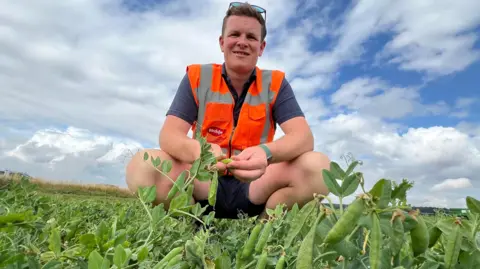In recent developments concerning the agricultural landscape of the United Kingdom, farmers are expressing significant concerns over a potential shortage of peas. This comes as the country experiences its earliest harvest in over a decade, primarily driven by prolonged periods of sunshine and an acute lack of rain. The National Farmers’ Union (NFU) has reported alarming figures: vining pea growers, particularly in regions like Lincolnshire, Norfolk, Suffolk, and East Yorkshire, are witnessing as much as a 30% reduction in yield this season.
One farmer, located in Louth, expressed trepidation about the implications of this dramatic yield drop, suggesting it could lead to noticeable shortages in supermarket supply chains. The adverse effects of climate have played a crucial role in this year’s harvest. The Met Office has noted that England had its driest spring in over a century, which has contributed to the excessive warmth experienced throughout June, marking it as the warmest June on record.
Notably, the recent climate conditions have resulted in unusual growth patterns for the peas. Some regions faced the challenges of three consecutive heatwaves during June and July, causing soil moisture levels to deplete rapidly. According to Henry Moreton, a regional NFU chair in Lincolnshire, crops have suffered greatly due to “extreme heat and lack of moisture.” He elaborated that the east coast, renowned for its fertile vining pea land, currently faces a dire situation. He mentioned that peas are typically harvested well into August, but this year the harvesting season began unusually early on June 4.
Farmers are reporting that the quality of the peas is also in jeopardy. Many pea pods have seen declines in their yields, with some containing as few as two viable peas, while the remainder have shriveled from dehydration or excessive heat stress. Ian Watson, operations manager for Stemgold Peas, which collaborates with a multitude of farms across Lincolnshire, echoed this sentiment, stating that the dry conditions have resulted in thinner crops and significantly reduced yields.
Conversely, despite lower volumes, the peas that are being harvested are reportedly sweeter than normal, thanks to the sun exposure. Michelle Lawrie, a quality manager with Birds Eye—a company known for processing frozen peas—has noted that the extreme weather has resulted in exceptionally sweet peas this season. Lawrie regularly tastes numerous samples daily to ensure the quality of the produce remains high, a crucial requirement given the condensed harvest timeframe.
Tom Screeton, a senior agriculture fieldsman at Birds Eye, further elaborated on the logistical obstacles brought on by this year’s weather. He explained that the lags in harvesting due to fast-maturing crops have created a compressed two-and-a-half-hour window to process the peas from harvest to freezing, presenting substantial operational challenges.
In light of the ongoing situational challenges, agricultural experts recognize the necessity for innovation in crop management strategies. Tom Screeton emphasized the importance of developing more resilient pea varieties that can withstand the volatility of climate conditions. While the ongoing breeding program aims to enhance drought resistance, he acknowledged that farmers are often at the mercy of the unpredictable nature of the climate.
The situation surrounding the UK pea harvest serves as a poignant example of the broader impacts of climate change on food supply chains, highlighting the urgent need for robust agricultural practices that can adapt to increasingly erratic weather patterns. The dual challenge of potentially reduced supplies combined with growing consumer demand will likely influence market prices and availability in the foreseeable future.












